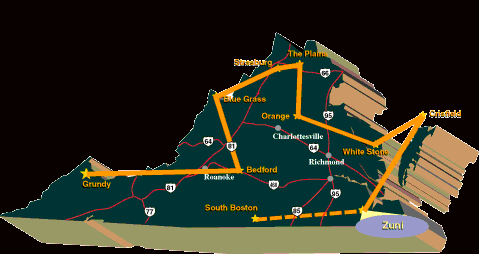
Download
in PDF Format
It's
the people who keep this community going
Back in the 1950s and �60s, people
connected Zuni, Virginia, to Wright�s Barbecue, a must-stop for
travelers on Route 460 before Interstate 64 made parts of the route
ghost-like. Today the building that housed Wright�s houses a church, and
�old Zuni� is little more than a bend in the road with a collection of
houses. Few recall the days long ago when Zuni was a thriving village,
complete with stores, hotel, and train depot.
|
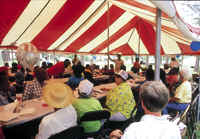
Crowds
gather for Zuni Day each August. |
Seven miles west of the town of Windsor
in Isle of Wight County, Zuni abuts the Blackwater River that serves as a
boundary with Southampton County. According to Lucy Robinson of the Zuni
Post Office, 105 post office boxes and 742 rural deliveries bear Zuni
addresses, but no one really knows the village�s exact population.
Long-time residents estimate no more than 150 people live in the �bend
in the road� that old-timers refer to as Zuni.
�Elder� Frank Johnson, 80, describes
Zuni today: �A little place off Route 460 ... if you don�t watch it,
you�ll run through it before you know you got to it!�
|
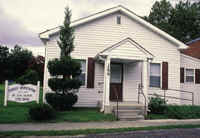
A
dentist's office in what was once "downtown Zuni." |
To find what�s left of �old� Zuni,
driving east from Petersburg on Rt. 460, go through Wakefield and Ivor,
cross a small bridge over the Blackwater River, and turn right. You�ll
drive down a street with houses, a Presbyterian church, a dental office,
and an old peanut storage facility with a falling-down silo � all that
remains of once-bustling Zuni.
Also in Zuni: a smattering of small
businesses and Zuni Gourmet Peanuts & Plants, an enterprise of
Presbyterian Homes and Family Services that provides sheltered employment
to mentally challenged adults in conjunction with Zuni Presbyterian Homes.
The surrounding area includes farms, pastoral land, individual houses, and
a half-dozen churches. Residents farm, operate small businesses like the
recently opened Pearl Line Press Inc., or commute to employment.
|
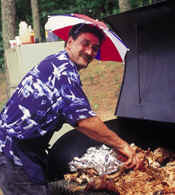
Ronald
Dodd of Chesapeake volunteered for the barbecue grill at Zuni Day. |
Jane March, a Portsmouth native and
widow, came to Zuni in 1967 when she �married into a Zuni family,� she
says with a laugh. The self-employed March is working on a book on
Zuni�s history.
�I�m doing it so people will know
there was a Zuni, a thriving community where four passenger trains stopped
every day,� March says. �Whenever I talk to the old-timers, I�d
think, all this is going to be lost. I think it�s important to save this
history.�
The origin of the town�s name remains
mysterious. Local Indians were the Nottoways, not the Zunis, a New Mexico
tribe. But what�s not mysterious is the village Zuni used to be.
�There was an old hotel three stories
high, with a walkway from the second floor to the top of the railroad,�
recalls Walter �Jiggs� Butler, 87, who traveled to 27 countries and 43
|
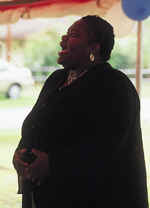
Monica
Whitney of nearby Ivor shares a song at Zuni Day. |
states during a 20-year Army
career before coming home to Zuni. �They had 13 artesian wells that
would flow continuously and a well, now gone, where people would bring
horses to water them. There was a peanut factory that worked a hundred
people, a cotton gin that worked about 25 people, and a soap factory.�
According to Butler, The Happy Days Soap
Factory was a sad tale: �Two people came here from out west and sold
bonds to build the factory. It worked about 25 people. After they got it
running good, they took off with all the money. Everyone lost their jobs,
and the bonds were worthless.�
|
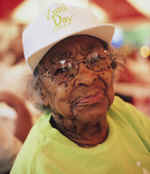
Evelyn
Joyner Warren, 100, has lived in Zuni all her life. "In the
old days, everybody farmed - peanuts, corn, tobacco," she
says. |
Evelyn Joyner Warren remembers the soap
factory; the 100-year-old widow also remembers, �You could ride the
excursion train from Zuni to Norfolk for one dollar. Both freight and
passenger trains stopped in Zuni.�
Warren, who married at 24, farmed with
her husband. When he died at age 46, she continued farming by herself to
support her children.
Talking to locals and reading old
newspaper clippings, one can see the elements of old Zuni: a hotel, cotton
gin, a peanut factory near the railroad tracks, a barber shop, and several
stores. Zuni served as a coal-and-water refueling stop for steam-engine
trains. The village was mentioned as early as 1745 in one history,
although March says Zuni didn�t make it to a map until 1864. In one 1907
account, Zuni was described as having �three general stores, one
blacksmith shop, one livery stable, one hotel, and in recent years has
become a very fine peanut market, made so by the bustle of its
businessmen, often rivaling Smithfield in prices.�
March displays an undated newspaper
clipping reporting on a fire that destroyed �half of Zuni�s business
section.� The article reported a filling station, poolroom, barber shop,
general store, and the post office were �razed to the ground despite
heroic efforts of citizens who formed bucket brigades to save them.�
|
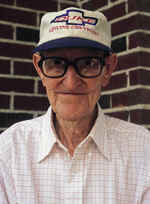
Walter
"Jiggs" Butler remembers a fire in Zuni that destroyed
half of the village's businesses. "I said, 'Daddy, get up,
Zuni is on fire!' Daddy said, 'Feel the walls, if it's not hot, go
back to bed.' Butler recalls with a laugh. |
March says the fire occurred in 1931.
Butler remembers the fire vividly, adding, �I�d always heard the smoke
stacks of the steam train caught the grass on fire and it spread to
buildings.� Other reports blamed a discarded smoldering cigarette.
More fires, flooding, and the 1999 flood
rampage created by Hurricane Floyd continued to wreak havoc on Zuni. But
Zuni remains a community, thanks to its strongest point: its people. The
people are friendly, their sense of community anchored by their churches.
�The flood of 1999 was devastating,�
admits Shirley Harris, director of Zuni Senior Center, who moved to Zuni
when she married Emory Harris. �Some friends lost everything they had.
We lost probably about six or eight houses in Zuni, and the lower level of
my house was flooded out. We had no insurance, but the government helped
tremendously.�
|
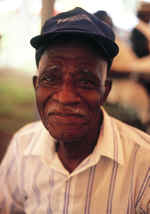
"Elder"
Frank Johnson recalls, "In the old days, you could buy a
12-lb. sack of flour for 50 cents. Zuni had five or six stores,
and they all did good business." Johnson is an elder at
Walnut Grove Baptist Church. |
Despite the flood, Harris says she
wouldn�t live anywhere else: �It�s really a paradise here, peaceful
and quiet, with churches that are not competitive but work for the
people.�
The sense of community is felt at the
annual �Zuni Day,� held the second Saturday of August. Hosted at the
home of Lucy and Jack Newby, this year�s event started with a gospel
group singing, �He allowed us to come together one more time.�
Hundreds gathered under a big red-and-white tent for music, food, and
fellowship. Michael Perry, who offered a reading from Psalm 133 (�how
blessed it is to dwell together in unity�), told the audience with a
laugh, �This time last year I was in the desert in Afghanistan �
it�s better here!�
|
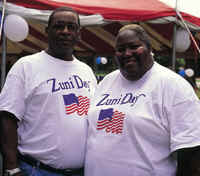
Lucy
and Jackie Newby host Zuni Day at their home. |
Lucy Newby says six families (Butler,
Saunders, Simmons, Harris, Warren, and Newby) comprise the committee
organizing each year�s event. Committee members provide groaning tables
of cabbage, string beans, and fried chicken, while men barbecue pigs, fry
fish, and grill burgers. The event is funded by donations, and has a
strong Christian emphasis.
The Newbys, who moved to Zuni 23 years
ago, say Zuni�s people and sereneness attracted them. Lucy Newby adds,
�Everybody keeps to themselves, but if you need the community to come
together for you, they will. This is a place where you can let your
children play outside [and not worry about them].�
George Joyner, 77 and retired from the
Norfolk Naval Shipyard, still lives in the Zuni house where he was born:
�I was never tempted to move to the city. I never liked city life.�
A long-time presence is Zuni Gourmet
Peanuts & Plants, in Zuni 28 years. The 300-acre Presbyterian Homes
& Family Service site includes four homes for mentally challenged
adults, three new independent-living apartments, the peanut shop, and a
greenhouse. Zuni home residents work in the peanut shop and greenhouse.
�We operate year-round but our main
business is seasonal, fall through Christmas,� explains peanut and plant
shop manager Nancy Winslow. �In the spring we work in the greenhouse for
six months, selling bedding plants and hanging plants. The peanut shop
sells its homemade product, produced one batch at a time, to locals as
well as through mail-order and Internet sales.�
Newcomers Shirley and Ron Nelson, both
in their early 50s, are part of a new wave of people moving to Zuni.
Employed at the Norfolk Naval Shipyard, the Nelsons are relocating from
Virginia Beach to a Christmas tree farm in Zuni. A desire for land led
them to purchase a 35-acre site with six acres of Christmas trees. They
plan to open Zuni Tree & Alpaca Farm, Inc., the Saturday before
Thanksgiving, with a shop featuring Christmas decorations, gifts, and
personalized children�s books. Their eastern white pine �choose and
cut� Christmas trees will also be available. They will also offer gift
products made from the fiber of the llama-like alpacas that graze in their
pastureland.
�Virginia Beach was too congested.
Here it�s peaceful and quiet, and we have nice neighbors,� Shirley
Nelson explains.
Several co-workers had moved to the
area, they add, noting that rural lifestyle, reasonable prices, and lower
taxes prompted their move.
Showing off bags of recently sheared
alpaca fiber, Ron notes, �I do all the shearing. It�s very hard work,
but it�s actually helped me, and our health, physically.�
|

Alisa
Joyner, 9, Romane Joyner, 6, and Endia Butler, 8, enjoy the
celebration. |
Many children and young people were at
the annual Zuni Day, which is reminiscent of a community-wide family
reunion. But Shirley Harris says Zuni has few young people; many move away
for employment opportunities. She calls the lack of younger people in a
community she describes as �primarily 40s, 50s, and up� Zuni�s
biggest challenge.
Locals also worry about what they
believe is coming growth in Zuni. March says, �People who grew up in
cities are starving
for the country, and those people are
coming here.�
The downside, which March says is most
visible in nearby Smithfield where subdivisions are mushrooming, is people
who say they want country living, but move to rural areas and demand
�instant 911 and water and sewer systems.�
�People here, we want to see the
stars,� she explains.
�The reason I am here, I love
gardening and the outdoors,� says Walter �Jiggs� Butler.
He adds, �We had nothing when we came
along, and we helped one another. I plant four gardens, and open them to
people for free vegetables. I�d rather be in the country. I�ve been in
some big cities, and I can�t stand that bumpin� shoulders in the
street.�
Many old buildings may be gone, but Zuni
citizens continue to keep this rural community alive.
Jane March is working on a book focused
on the history of Zuni. If you have any information, or want more
information about her project, please call Ms. March at (757) 242-3807.